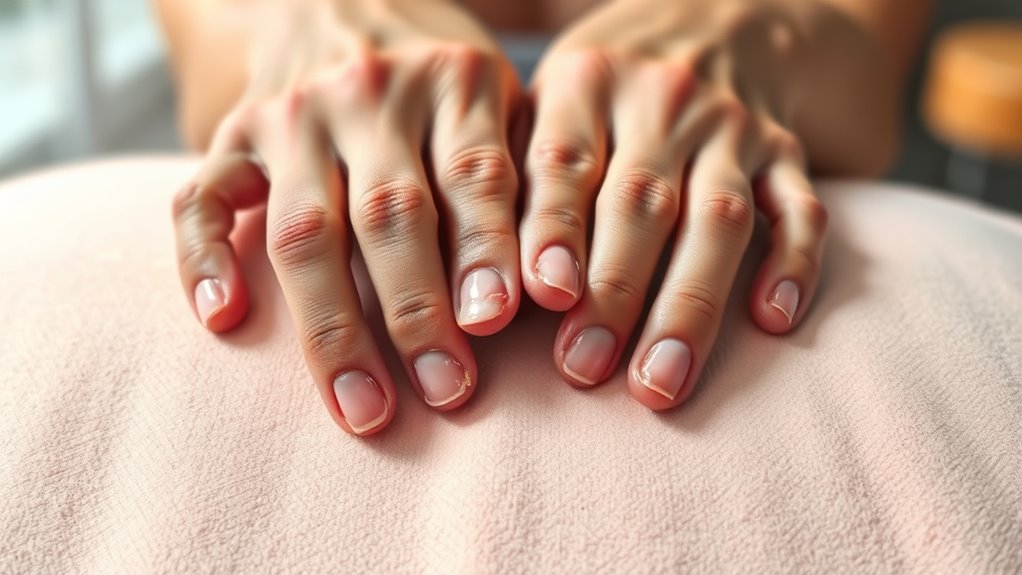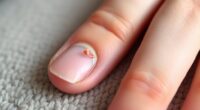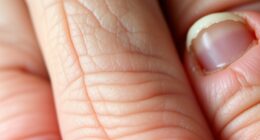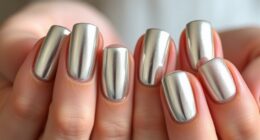To stop biting your nails for good, start by managing stress with techniques like deep breathing or meditation, and find healthy alternatives such as soothing nail or cuticle massages. Keep your nails well-trimmed and moisturized to reduce temptation, and apply bitter-tasting polish to make biting less appealing. Celebrate small successes and stay patient—breaking a habit takes time. If you want to discover more effective strategies, keep exploring ways to support your journey to healthier nails.
Key Takeaways
- Replace nail biting with healthy habits like gentle nail or cuticle massage to redirect focus.
- Manage stress through deep breathing, meditation, or physical activity to reduce subconscious biting triggers.
- Maintain well-trimmed, moisturized nails and avoid harsh chemicals to promote nail health and deter biting.
- Set small, achievable goals and celebrate milestones to build motivation and reinforce positive changes.
- Use deterrents like bitter-tasting nail polish and keep hands busy with fidget toys to curb the habit.

Nail biting is a common habit that can be tough to break, but with the right strategies, you can stop for good. One of the first things you need to understand is how nail health is affected by this habit. Constant biting can cause damage to your nails, leading to peeling, splitting, and even infections. When you damage your nails regularly, it takes longer for them to grow back healthy, which makes the habit seem more tempting. To protect your nail health, start by keeping your nails trimmed and well-maintained. Short nails are less tempting to bite and less likely to sustain damage. Applying a bitter-tasting nail polish can serve as a deterrent, making biting less appealing. But beyond the physical, managing stress is *essential* because nail biting is often a subconscious response to anxiety or boredom. When you’re feeling stressed, your mind seeks a quick fix, and biting your nails becomes an easy outlet. Learning effective stress management techniques can help reduce the urge to bite. Techniques like deep breathing, meditation, or even regular physical activity can help lower your overall stress levels. When you notice yourself starting to bite, pause and take a few deep breaths to calm your nerves. Keeping your hands busy with a stress ball or fidget toy can also redirect your focus and reduce the likelihood of biting. Creating a new, healthier habit to replace nail biting can make a big difference. For example, whenever you feel the urge, try gently massaging your nails or applying moisturizer to your cuticles. This not only keeps your nails looking healthy but also provides a soothing, tactile alternative. Setting small goals can keep you motivated—like going a day, then a week, without biting. Celebrate these milestones to reinforce your progress. Remember, breaking a habit takes time and patience, so don’t get discouraged if you slip up. Consistency is *vital*, and over time, your new, healthier habits will replace the old ones. Focus on nurturing your nail health by avoiding harsh chemicals and keeping your hands moisturized, which can make your nails less prone to damage and less tempting to bite. Combining these physical and mental strategies will *considerably* increase your chances of success. With persistence and care, you’ll find that managing stress and prioritizing nail health go hand in hand, helping you kick the nail-biting habit for good.
Frequently Asked Questions
Can Biting Nails Be a Sign of Underlying Health Issues?
Nail biting can sometimes signal underlying health issues, but it’s often caused by stress, anxiety, or boredom. While nail biting causes minimal health implications for most, it can lead to infections or dental problems if done excessively. If you notice persistent nail biting despite trying to stop, it’s worth considering if stress or other health concerns are involved. Addressing these root causes can help reduce the habit and improve your overall well-being.
Are There Specific Foods That Help Reduce Nail-Biting Urges?
Imagine a world where your cravings vanish instantly—that’s what the right foods can do! Nutritional strategies, like eating crunchy vegetables or protein-rich snacks, help curb nail-biting urges. Incorporate dietary supplements such as biotin or magnesium, which support healthy nails and reduce the urge to bite. These foods and supplements work together to strengthen your nails and distract your mind, making it easier to break the habit for good.
How Long Does It Typically Take to Break the Nail-Biting Habit?
The habit duration for breaking nail-biting varies, but with consistent effort, most people see progress within a few weeks. Behavior change takes time, and patience is key. Typically, it takes about 3 to 4 weeks to develop new habits and reduce the urge. Stay committed, replace the habit with healthier activities, and celebrate small victories to make the process smoother and more effective.
Is Nail-Biting More Common in Certain Age Groups or Genders?
Think of nail-biting as a chameleon changing with its surroundings. You might notice it’s more common in teens, where age-related habits flourish, or among women, possibly tied to stress or grooming habits. Gender differences can influence this behavior, with societal expectations shaping habits. Age-related habits often fade with maturity, but understanding these patterns helps you break free, regardless of your gender or age.
Can Stress Management Techniques Prevent Nail-Biting?
Managing stress can definitely help prevent nail-biting. When you practice mindfulness techniques or relaxation exercises, you become more aware of your triggers and learn to relax instead of biting your nails. These techniques reduce anxiety and help you stay calm during stressful moments. By consistently using mindfulness and relaxation exercises, you can break the nail-biting habit and develop healthier coping strategies for handling stress.
Conclusion
Just like Icarus learned, flying too close to the sun has its risks. Breaking the nail-biting habit takes courage and persistence, but you’re capable of more than you realize. With every effort, you’re rewriting your story—no longer a prisoner to old habits. Remember, even the strongest wings need time to strengthen. Keep going, and soon you’ll soar free from that pesky habit, proving that you’re the hero of your own epic transformation.









